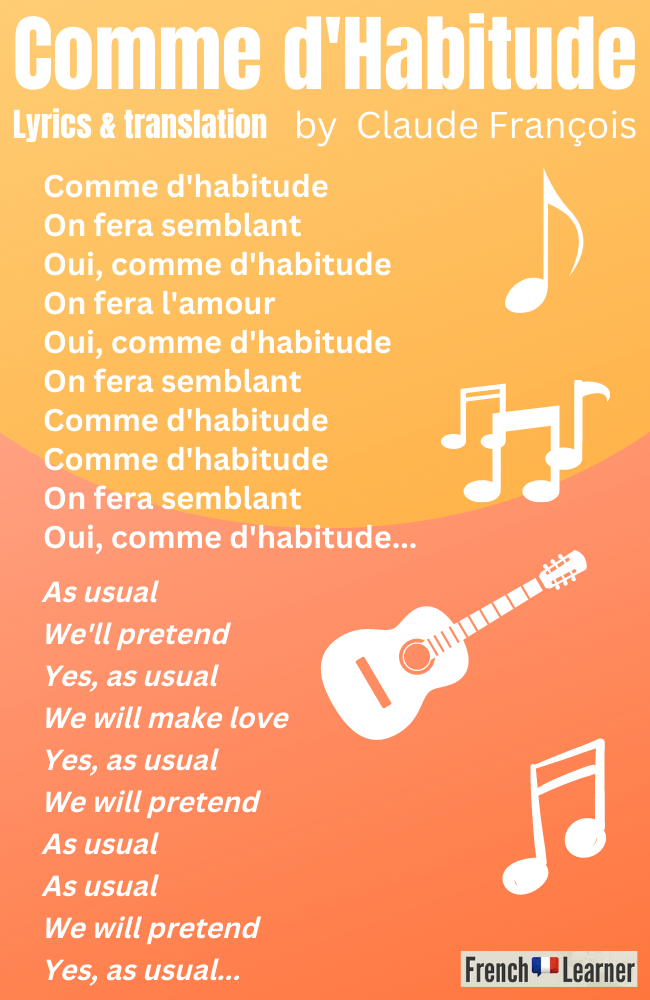Comme D’habitude (Meaning: As Usual; Pronunciation kɔm dabityd) is a hit French song by Claude François and the original version of Frank Sinatra’s signature song My Way. Released in 1967, the song was composed by Jacques Revaux with lyrics written by François. Keep reading for in-depth explanations of the vocabulary and grammar of the song’s lyrics.

Comme d’habitude song overview
The lyrics of Comme d’Habitude depict the story of two lovers who have fallen out of love. The male voice takes the listener through the course of a usual day that the couple experiences.
He describes the events of the day from waking up together, going to work, coming home and going back to bed and making love.
The singer is emotionally distraught as it’s clear that the couple is pretending that everything is fine when in reality the love has disappeared.

Other recordings
Many other artists have made recordings of of Comme d’Habitude including Michel Sardou, Mireille Mathieu, Khaled, Florent Pagny and M. Pokora.
Listen to Comme d’Habitude
The following YouTube video for Comme d’Habitude provides and the French lyrics with English translation.
You can also listen on Spotify.
Lyrics analysis
In this following section we’ve selected lines from the the lyrics of Comme d’Habitude when we feel offer interesting insights into learning French vocabulary and grammar.
Je me lève, Et je te bouscule
These two lines translate to “I get up, And I give you a push”. Je me lève (I get up) is the first-person singular (je) form of the reflexive verb se lever (to get up).
The verb bousculer has several translations including to jostle, push and shove. The te in this line can translate to “you”, “to you” and “at you”. This page on our site covers various ways of saying you in French.
Comme d’habitude
The meaning of the song’s title, Comme d’habitude, is an expression which translates to “as usual”. The word comme translates to “like” or “as”. Habitude translates literally to “habit” or “custom”.
Sur toi je remonte le drap
This line translates to “I put the sheet back over you”. The verb remonter has several translations including to pull up. Drap translates to sheet.
J’ai peur que tu aies froid
This line translates to “I’m afraid you’re cold”. J’ai peur is an expression that uses the verb avoir (to have) and translates literally to “I have fear”.
Que tu aies froid is also an expression that uses the verb avoir and translates literally to “that you have cold”. This line also used the subjunctive mood, which is used for expressing fear, doubt and emotion.
Ma main caresse tes cheveux
This line translates to “My hand caresses your hair”. Translations of the verb caresser translate include to stroke, caress and fondle. Cheveux means hair and always appears in the plural form. This page on our site covers body parts vocabulary.
Presque malgré moi
This line translates to “Almost despite myself”. The preposition presque translates to almost, nearly and just about. Malgré means despite or in despite of. Moi means “me”. This page on our site covers various ways of saying “me” in French.
Mais toi tu me tournes le dos
This line translates to “But you turn your back on me”. Mais means “but” in French. This line can also translate to “You turn your back towards me”.
Et puis je m’habille très vite
This line translates to “Then I get dressed very quickly”. Et puis translates literally to “an so” but means “then” as an expression. Très vite can translate to “very quickly” or “very fast”.
Je sors de la chambre
This line translates to “I leave the bedroom”. This page on our site covers vocabulary for rooms in the house. Translations for sortir include “to leave” and “to exit”.
Tout seul je bois mon café
This line translates to “Tout seul je bois mon café”. Seul as an adjectives means lonely. The expression tout seul means “alone” or “all alone”. Mon means “my” in French and is a possessive adjective. This blog post on our site covers French customs for drinking coffee.
Sans bruit je quitte la maison
This line translates to “Without (making any) noise I leave the house”. The verb quitter also means “to leave”. This verb is used in the title of Jacque Brel’s signature song, Ne me quitte pas.
Tout est gris dehors
This line translates to “everything is gray outside”. Tout has several uses and translations including “all” and “everything”. Est is the third-person singular form of the verb être (to be) in the present tense.
Gris means gray in French. This page on our site covers vocabulary for colors in French. Dehors translates to “outdoors” or “outside”.
J’ai froid, je relève mon col
This line translates to “I’m cold, I pull up my collar”. The verb relever has several translations including “to pull up”. Col also has several translations, one of which is “collar”.
Toute la journée
This line translates to “All day long”. In French, journée refers to the daytime or course of the day. Jour also means day but is used in the context of a day as a unit of time. Bonne journée means “have a nice day” and is the title to a song released by Stromae in 2022.
Je vais jouer à faire semblant
This line translates to “I’m going to make believe”. The construction aller (to go) + infinitive means “I’m going to”. This is the French futur proche, a commonly used French future tense. The expression faire semblant means to pretend.
Je vais sourire, Je vais même rire
These lines translates to “I’m going to smile, I’m even going to laugh”. Again, this line uses the futur proche, or “going to” tense. Même in French has several translations and usages including “even”.
Enfin je vais vivre
This line translates to “At least I’m going to live”. Enfin can also be translated to finally, at any rate and anyways. There are two ways to say “to live” in French: habiter and vivre. Vivre means to live in the sense of being alive and having experiences.
Et puis le jour s’en ira
This line translates to “Then the day will go”. This line as difficult to translate. The reflexive verb s’en aller means “to be off” or “to leave”. In the first-person singular (je) form, je m’en vais can translate to “I’m outta here”.
Moi je reviendrai, Toi tu seras sortie
These lines translate to “I’ll come home, You’ll be gone”. In French moi and toi mean me and you and are called stressed (or disjunctive) pronouns. Tu seras sortie translates literally to “you will have left” and is an example of the past future tense. For example, j’aurai mangé (I will have eaten).
Et pas encore rentrée
This line translates to “And not come home yet”. In French, encore means still, yet and again. When combined with pas (as in ne…pas used in French negation), pas encore means no yet.
Tout seul j’irai me coucher
This line translates to “All alone I’ll go to bed”. The verb coucher translates to “to put to bed”. In the reflexive form, it mean “to go to bed”.
Dans ce grand lit froid
This line translates to “In this big cold bed”. Dans means “in” in the context of “inside of”. This page covers en vs. dans (to ways to say “in” in French.
Grand lit froid means “big cold bed”. Adjective placement can be tricky in French as some adjectives come before the noun they modify and some come after. This page on our site covers French adjectives in detail.
Mes larmes je les cacherai
This line translates to “I will hide my tears”. The les in this line in a direct object pronoun meaning “them”. This page on our site covers direct and indirect object pronouns
Même la nuit
This line translates to “even at night”. While the la in the line is a definite article and translates literally to “the” in means “in the” or “during the” or “at” in the context of this line.
Tu rentreras, Je t’attendrai, Tu me souriras
These lines translates to “You will come home, I will wait for you, You will smile at me”. All three of these lines are in the French future tense called the futur simple.
Tu te déshabilleras, Tu te coucheras, On s’embrassera
These three lines translate to “You will get undressed, You will go to bed, We will kiss”. All three of these verbs are reflexive and conjugated in the futur simple tense.
On fera semblant, On fera l’amour
These two lines translate to “We will pretend, We will make love”. Both of these lines uses the French personal pronoun on, which has many uses and translations including “we”. This page on our site covers the personal pronoun on in detail.

Comme d’Habitude French Lyrics & English Translation
Je me lève
Et je te bouscule
Tu ne te réveilles pas
Comme d’habitude
Sur toi je remonte le drap
J’ai peur que tu aies froid
Comme d’habitude
Ma main caresse tes cheveux
Presque malgré moi
Comme d’habitude
Mais toi tu me tournes le dos
Comme d’habitude
I get up
And I give you a push
You don’t wake up
As usual
I put the sheet back over you
I’m afraid you’re cold
As usual
My hand caresses your hair
Almost despite myself
As usual
But you turn your back on me
As usual
Et puis je m’habille très vite
Je sors de la chambre
Comme d’habitude
Tout seul je bois mon café
Je suis en retard
Comme d’habitude
Sans bruit je quitte la maison
Tout est gris dehors
Comme d’habitude
J’ai froid, je relève mon col
Comme d’habitude
Then I get dressed very quickly
I leave the bedroom
As usual
All alone I drink my coffee
I’m late
As usual
Without (making any) noise I leave the house
Everything is gray outside
I’m cold, I pull up my collar
As usual
Comme d’habitude
Toute la journée
Je vais jouer à faire semblant
Comme d’habitude
Je vais sourire
Comme d’habitude
Je vais même rire
Comme d’habitude
Enfin je vais vivre
Comme d’habitude
As usual
All day long
I’m going to make believe
As usual
I’m going to smile
As usual
I’m even going to laugh
As usual
At least I’m going to live
As usual
Et puis le jour s’en ira
Moi je reviendrai
Comme d’habitude
Toi tu seras sortie
Et pas encore rentrée
Comme d’habitude
Tout seul j’irai me coucher
Dans ce grand lit froid
Comme d’habitude
Mes larmes je les cacherai
Comme d’habitude
Then the day will go
I’ll come home
As usual
You’ll be gone
And not come home yet
As usual
All alone I’ll go to bed
In this big cold bed
As usual
I will hide my tears
As usual
Mais comme d’habitude
Même la nuit
Je vais jouer à faire semblant
Comme d’habitude
Tu rentreras
Oui, comme d’habitude
Je t’attendrai
Comme d’habitude
Tu me souriras
Oui, comme d’habitude
But as usual
Even at night
I’m going to make believe
You’ll come home
Yes, as usual
I’ll wait for you
As usual
You’ll smile at me
Yes, as usual
Comme d’habitude
Tu te déshabilleras
Comme d’habitude
Tu te coucheras
Comme d’habitude
On s’embrassera
Comme d’habitude
As usual
You will get undressed
As usual
You will go to bed
As usual
We will kiss
As usual
Comme d’habitude
On fera semblant
Oui, comme d’habitude
On fera l’amour
Oui, comme d’habitude
On fera semblant
Comme d’habitude
Comme d’habitude
On fera semblant
Oui, comme d’habitude…
As usual
We’ll pretend
Yes, as usual
We will make love
Yes, as usual
We will pretend
As usual
As usual
We will pretend
Yes, as usual…
Discover more French songs
- Top French songs of all time
- La Vie En Rose (Edith Piaf)
- Le Sud (Nino Ferrer)
- Joe Le Taxi (Vanessa Paradis)
- Pour que tu m’aimes encore (Céline Dion)
- Tous Les Garçons Et Les Filles (Françoise Hardy)
- Et Si Tu N’Existais Pas (Joe Dassin)
- Je T’aime…Moi Non Plus (Serge Gainsbourg)
- Dominique (Singing Nun)


